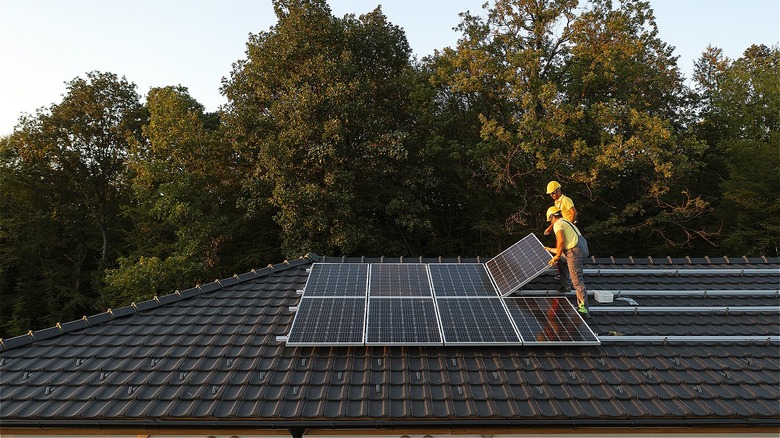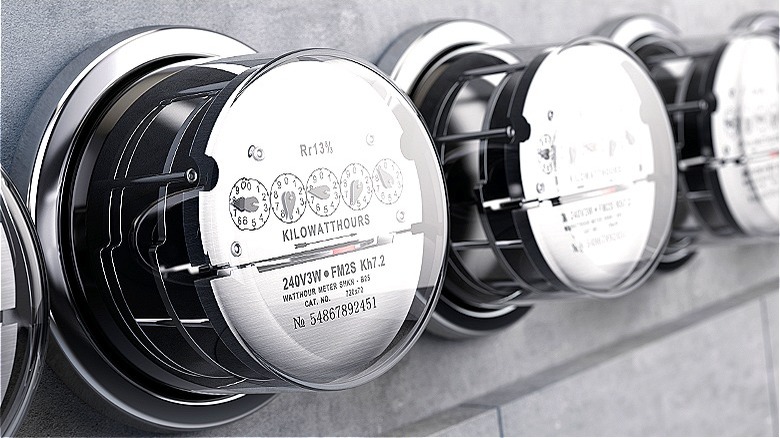How Much Can Solar Really Save You On Your Energy Bill?
Chances are someone you know has either committed to or at least investigated adding solar panels to their home. You might even find yourself curious about the process, especially if you've talked to a neighbor or a coworker who has already taken the plunge, and you're not alone. According to the Solar Energy Industries Association, the solar industry has experienced an average annual growth of 24%, which has led to a current solar capacity of 162 gigawatts, enough to power 30 million homes across the country.
While solar is by far a more environmentally friendly option over traditional energy solutions, perhaps the biggest selling point for many people is the potential to save money on their energy bills. In the face of rising utility costs and inflation, you might find yourself looking to solar as a way to help you save. While, yes, solar can save you money, it's important to realize that the process is slightly more complicated than calling your utility provider.
First and foremost, solar's steep up-front costs can be off-putting to those who might not expect it. Plus, potential solar-power converts could, and should, do a fair bit of research on everything from utility buybacks to solar-panel pricing to potential tax credits before deciding if solar power is right for them. Given the long-term nature of a solar-system investment, note that solar is more suited to those who plan to stay in their house for the next 20 to 30 years.
The financial outlay of going solar
Pursuing solar energy is both a time- and cost-intensive process. From pricing and sourcing the panels themselves to installation and labor costs, there's quite a bit of pre-planning involved before you can ever hope to see a change in your energy bill. The initial investment can also be more expensive than many might realize with average residential systems costing roughly $25,000, per SEIA. However, this price nonetheless represents a 40% drop in installation costs since 2010, so going solar has increasingly become more affordable. Plus, there are more credits and rebates available every year for those who make the switch.
Certain states and geographic areas offer hefty solar incentives, rebates, and even tax credits that could end up significantly lowering start-up and installation costs. Not to mention, the federal solar tax credit, which increased its rebate on new solar installations, starting in 2024, to 30% (up from 26%) through 2032. Even with these considerations in mind, however, remember that solar is still a long-term investment. Forbes estimates the average payback period for solar panels ranges from five to 10 years, so it's not exactly a short-term solution to energy bills. Also, you'll want to make sure to check your sun exposure and even your current electricity rates to determine if switching to solar energy would even be financially worth it.
The savings potential of solar energy
In 2023, solar energy was estimated to save users an estimated $1,500 on energy bills every year. If electricity prices stay exactly the same as 2023 rates, a person today with a solar-panel system could expect to save anywhere from $25,000 to $33,000 in total electricity bills during the life span of their specific solar system. Of course, given that utility, and especially electricity, prices continue to rise across the country, a person with a solar-panel system can actually expect to save considerably more. Plus, most solar panels last between 25 to 30 years, so you definitely save money in the long run by switching to solar energy, even if the upfront costs feel daunting.
Another way solar can help you save money is through net metering programs, which exist in 45 states. Net metering allows residential solar users to sell the electricity they aren't using back into the power grid. By selling back your excess electricity, you can get a credit against the electricity you actually use. According to the Solar Energy Industries Association, an average of 20% to 40% of a solar system goes back into the grid, which can help to offset the energy load of your neighbors while also cutting down even more on your electricity bills. Keep in mind that most net metering policies were implemented as a way of encouraging solar system adoption, so these individual policy and program terms will more than likely change as solar becomes more popular and widespread.


